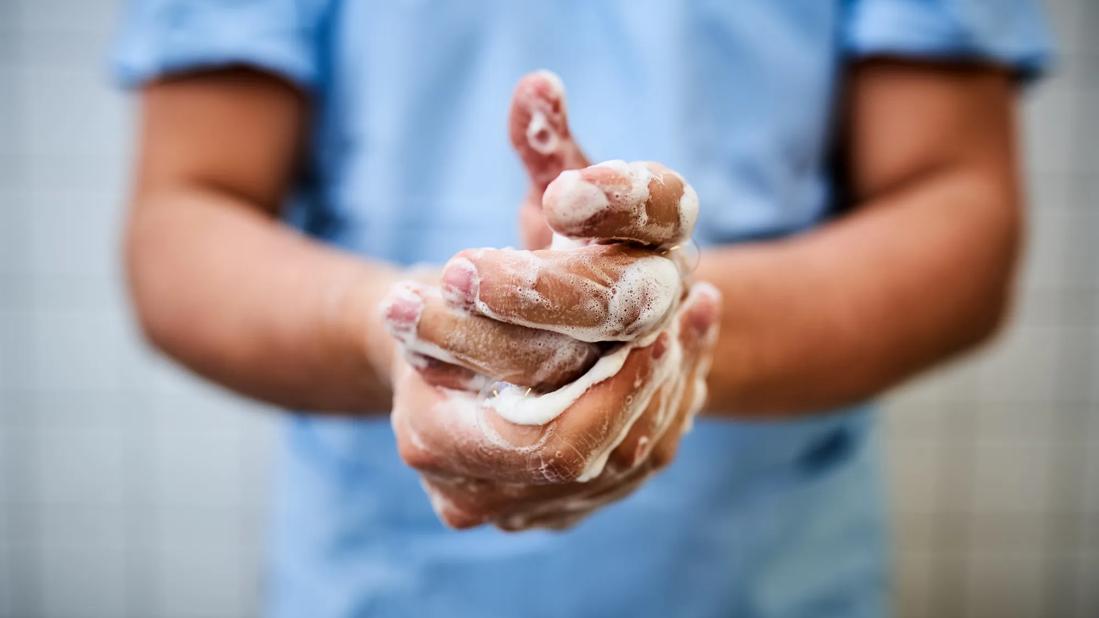SNAP is having a big impact at one regional hospital and beyond

Lutheran Hospital may be one of the smaller Cleveland Clinic hospitals, but when it comes to hand hygiene compliance, it is mighty. In 2016, this 203-bed city hospital achieved 95 percent hand hygiene compliance, due in large part to a clever hand hygiene campaign that is getting attention across the health system.
Advertisement
Cleveland Clinic is a non-profit academic medical center. Advertising on our site helps support our mission. We do not endorse non-Cleveland Clinic products or services. Policy
Two years ago Lutheran Hospital got serious about wanting to improve its hand hygiene compliance through a collaborative campaign involving all hospital caregivers. “Compliance with hand hygiene has always been a struggle for healthcare organizations,” says infection preventionist Christine Rose, BSN, RN, CIC, of Quality Assurance at Lutheran, who started the effort in mid-2014 by inviting all hospital caregivers to help create, select and implement a secret code word to be used to remind fellow caregivers to wash their hands.
“For a campaign to be successful, it is so important for everyone to be part of the process,” says Rose, who put the call out for ideas and received eight submissions from across the hospital. When it came to deciding which word to use, 382 caregivers cast their votes. The winner, with 37 percent of the vote, was SNAP.
It stands for Scrub Now and Prevent (SNAP) and it is used as the secret code word or gesture (as in snapping one’s fingers) in front of patients and visitors to inconspicuously alert another caregiver to clean their hands at key times when they are forgetting to do so. Once the word was decided on, a communication plan was put in place to ensure that caregivers across the hospital – from new hires to Environmental Services embraced the campaign. Since full implementation, Rose says, hand hygiene compliance has consistently gone up at Lutheran.
“While caregivers understand the importance of hand hygiene to patient safety, we all get busy and there is a reluctance to speak up and bring a missed opportunity to the attention of a fellow caregivers,” says Rose. “This SNAP intervention promotes a just culture in which everyone, no matter what job they hold, is empowered to discreetly remind another caregiver to wash their hands without fear of retaliation.”
Advertisement
When the project was discussed at an annual Cleveland Clinic quality event, it garnered the attention of leaders and is now being communicated throughout the health system. Now, the SNAP hand-washing poster can be seen at many hospitals, and the SNAP intervention toolkit is available on the health system intranet. As a system, Cleveland Clinic had 92 percent hand hygiene compliance in 2016, perhaps in part because of the SNAP campaign.
After 33 years as a nurse, Rose is pleased to see the effort taking hold at Lutheran and elsewhere. “We know that hand hygiene is the most effective intervention to stop the spread of infections,” says Rose. “Ultimately this is putting patients first by helping to ensure safe care.”
Rose continues to present the results of the effort both at Cleveland Clinic and externally.
Advertisement
Advertisement

Planning continues with critical, patient-focused input from nursing teams

Strengthening care through targeted resources and frontline voices

Embracing generational differences to create strong nursing teams

CRNA careers offer challenge and reward

An unexpected health scare provides a potent reminder of what patients need most from their caregivers

Cleveland Clinic Abu Dhabi initiative reduces ICU admissions and strengthens caregiver collaboration

Veteran nurse blends compassion, cutting-edge transplant training and military tradition to elevate patient care

Embrace coaching and other tips to be a stronger leader